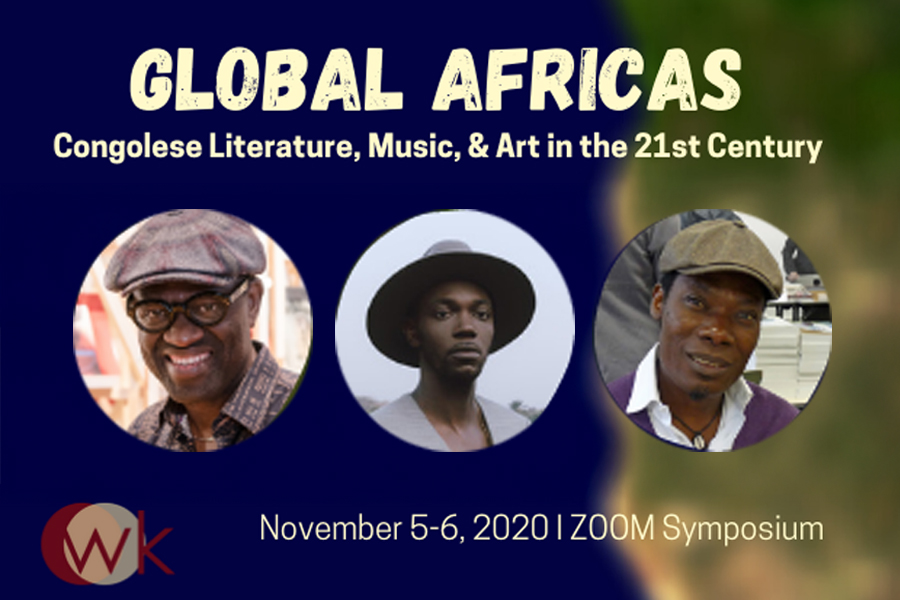Global Africas: Congolese Literature, Music, and Art in the 21st Century

About the Event
Special guests: Baloji, Alain Mabanckou, Pat Masioni
The Winthrop-King Institute is developing a new series of events under the broad title of “Global Africas,” the aim of which is to address and explore the plurality and complexity of everyday life on the continent both in the past as well as in the present while simultaneously insisting that Africa has always been globally interconnected with the rest of the world.
“Global Africas” examines the cultural, linguistic, political, and historical realities of Francophone regions of Africa from a range of academic and artistic perspectives. The inaugural Global Africas event is a two-day set of workshops, lectures, round tables, and performances that focus on the Republic of Congo and the Democratic Republic of the Congo, and the Congolese diaspora by featuring internationally renowned author Alain Mabanckou, the Paris-based artist and cartoonist Pat Masioni, and Belgium-based rapper Baloji.
The events are free and open to the public. The final program will be posted closer to the event. For further information, please contact the organizers, Michelle Bumatay (mbumatay@fsu.edu), Alexis Finet (afinet@fsu.edu), or Martin Munro (mmunro@fsu.edu).
Multi-award winning and multi-talented artist, the Belgium-based musician Baloji works on audiovisual representations of the cultural wealth of his Congolese roots. Made famous with his post-modern 2011 rap cover of the popular rumba classic "Indépendance Cha-Cha-Cha," his creations also function as a commentary on the current sociopolitical status of Congolese society. Named after the Swahili word for “man of science”, Baloji therefore combines what pleases the eyes to what pleases the ears; also exploring linguistic diversity so relevant to this region, his work vibrantly explores sounds and colors of Congolese heritage through the medium of music videos, recently peaking to the climax of his art with the creation "Zombie," winning the 2019 Oberhausen short movie festival.
World-renowned author, professor, and public intellectual Alain Mabanckou is undoubtedly one of the 21st century’s most prominent voices. Mabanckou’s work, richly dense with allusions to world literature, political discourse, comics, music, and fashion, not only spans space and time, but also literary genres and mediums. Most notably, drawing from his 2009 novel "Black Bazar" about a Congoloese sapeur in Paris, Mabankcou collaborated with musicians Modogo Abarambwa and Sam Tshintu to generate an album in 2012 of the same name in part to bring Congolese rumba to an international audience. Mabanckou, originally from the port city Point-Noire in the Republic of the Congo, has been a longtime critic of France’s bifurcated vision of the Francophone world and co-authored the famous 2007 Pour une ‘littérature-monde’ en français [“For a “World Literature” in French] also known as the Manifeste des 44 [“Manifesto of the 44”] (referring to the 44 writers who signed the manifesto published in Le Monde). His long list of accolades includes, alongside numerous prestigious literary prizes and nominations, invitations to preside over important literary festivals and public lectures.
Paris-based artist Pat Masioni, originally from the Democratic Republic of the Congo, studied painting and ceramics before attending the Académie des Beaux Arts in Kinshasa where he received a degree in architecture. Starting in the mid-1980s, Masioni began working professionally as an illustrator in Congo-Kinshasa, producing comics and textbook illustrations for the Kinshasa-based publisher Médiapaul. By 2000, Masioni’s work traveled beyond the borders of the DRC as he began contributing to international anthologies and participating in international competitions. Masioni’s detailed, hyper-real, and dramatic style attracted French documentarian Cécile Grenier and the two worked together on the two-volume graphic novel Rwanda 1994 about the Rwandan genocide. In 2009, Masioni began working with American comic book writer Joshua Dysart on the DC Comics/Vertigo series "The Unknown Soldier," making him one of the only African Francophone cartoonists published in the United States.
Nov. 5, 2020
- 10 to 11 a.m. EST: Discussion with artist Pat Masioni (in French)
- 11 a.m. to 12 p.m. EST: Discussion with musician and filmmaker Baloji
- 12:30 to 1:30 p.m. EST: Discussion with author Alain Mabanckou
Nov. 6, 2020
- 12:30 to 2:00 p.m. EST: Roundtable with Alain Mabanckou, Baloji, and Pat Masioni
The roundtable will be moderated by Dr. Bumatay and Alexis Finet with translations from French to English provided in the chat.
During all of the discussions and the roundtable, attendees may submit their questions that moderators will pose to the speakers.
Global Africas Introduction Video
